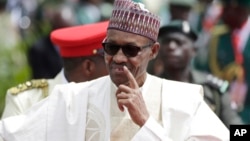Former militants in Nigeria’s Niger Delta say unrest may resume if the country's new president ends the amnesty program and monthly payments that brought peace to the oil-producing region.
Each month, former militants who used to spend their time bombing pipelines and kidnapping foreign oil workers in the Niger Delta get the equivalent of about $330 to convince them to occupy their time in other ways. They also get access to training programs intended to help them find other work.
This arrangement started in 2009, but it was never supposed to last forever. New Nigerian President Muhammadu Buhari said so in his inauguration speech last week, announcing the program would end in December.
He added that the government would, “invest heavily in the projects, and programs currently in place.” A spokesman for Buhari declined to comment further on the president's remarks.
Before his election last March, there were widespread fears that Buhari would allow the amnesty to end rather than extending it, as many militants hoped former president Goodluck Jonathan would do had he won the election.
Ruben Wilson, a former militant and chairman of a group of militant leaders, said it would be unwise for Buhari to let the amnesty lapse.
“It would be dangerous, dangerous for Mr. president to say he’s going to end amnesty program, it would be very, very dangerous, because this is something that is taking care of 30,000 people in the Niger Delta,” said Wilson.
Prior to the election, some former militants threatened violence if Buhari won office. Much of that rhetoric has subsided since the polls, and some militants even came out publicly to say they would give Buhari a chance.
Niger Delta activist Annkio Briggs said what Buhari did in the coming months would determine how the ex-militants react to the amnesty ending. But she said little has changed in the Delta since the amnesty started in 2009.
“There is the issue of environmental devastation, there is the issue of unemployment, there is the issue of just so much injustice in the Niger Delta, none of those things have been touched, as far as the Niger Delta people are concerned.” said Briggs.
During the height of the Niger Delta insurgency, militant attacks cut Nigeria’s oil production by about a third. Cutting off amnesty payments to the approximately 30,000 men involved in the program risks restarting the crisis, Wilson said.
“If he ends it, there will be too much crisis in the Niger Delta. Most of the people you see outside, most of them you seen at the road moving that you know, that they sustain through this amnesty salary, will likely go back to the creek, and when they go, it won’t bring good result to Nigeria,” said Wilson.
Nigeria can not afford any further disruption of its oil industry. Last year’s global fall in crude prices ravaged Nigeria’s budget. The country has few other options for money; 90 percent of government revenue comes from the oil industry.
(Hilary Uguru reported from Yenagoa, Nigeria, and Chris Stein from Dakar, Senegal.)




